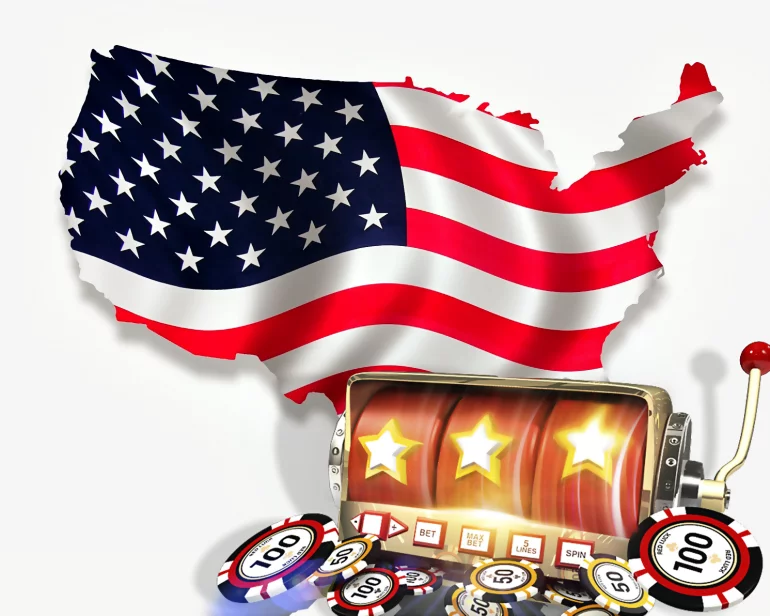We continue the subject started in the first part of the article, focusing on slot machines in brick-and-mortar casinos in the United States. There, we began to consider the situation with video slots in different regions of the United States. We discussed states where slot machines are allowed.
Slot Machines in the U.S.A.
Let's continue.

Wyoming
Wyoming Indian casinos offer bingo and traditional slot machines; there is no information about their RTPs.
Washington
Washington has twenty-eight casinos owned by Indian tribes. They offer the following entertainment:
- board games,
- electronic scratch cards,
- video slots.
The law does not oblige them to provide information on the payback in the games.
Wisconsin
All local casinos in the territories of indigenous communities are not required to report on the payback in their casino games.
West Virginia
In this state, you can play various games:
- keno,
- poker,
- blackjack,
- slot machines.
They have a theoretical return to the player from 80% to 95%. However, in most casinos, RTPs are no more than 90%.
Louisiana
Louisiana authorities require all slot machines installed in casinos to have a payback from 80% to 99.9%. If the slots operate outside the casinos, it must be no more than 94%.
Verification carried out in 2011 - 2012 found that the average return did not exceed 95%. However, it also does not fall below 88.5%.
Maine
In Maine, slot machines are available at Bangor Raceway Casino, which has been operating since 2005. By law, the minimum return is 89%. Test results showed that the actual payback in this casino was about 90.6%.
Maryland
Slot machines have been allowed in Maryland since 2008. Throughout the state, there are about fifteen thousand of them. One gambling club is permitted in each of the five districts.
The law requires local gambling operators to provide a payback rate of at least 87% in video slots, but there is no reliable data on the actual situation.
Massachusetts
Until 2009, residents of this state could gamble only on ships that sailed five kilometers from the coastline, but then they ceased operations.
In 2011, Massachusetts legalized gambling. The state can not have more than three casinos and one slot hall, but there were no casinos at the time of writing this article. The first casino is expected to open by the end of 2013.
Minnesota
All casinos are located within the Minnesota Indian reservations. They offer the following games:
- blackjack,
- poker,
- slot machines of one kind.
Additionally, you can find keno here.
- In poker and blackjack, the return should be from 83% to 98%;
- In keno, from 75% to 95%;
- In slots, from 80% to 95%.
As usual, information about the actual RTP is not provided.
Mississippi
Mississippi Gaming Commission does not have statistics on the level of theoretical return in some casinos, only limited data by region. This state has several casinos. Their video slots have RTPs of about 91% - 95%.
Missouri
Missouri also has more than a dozen casinos. The Local Gaming Commission regularly receives information about the average return level in the state's casinos. Rates vary from 89% to 91.5%. They include not only slot machines but also video poker, electronic keno, and some other games.
Michigan
In Michigan, there are seventeen Indian and three private casinos in Detroit. As we mentioned in the first part of the article, the law does not require the tribes to disclose the theoretical return of slot machines in their casinos. However, it requires a minimum payback of 75%. Thus, any information on the Detroit casinos is also absent.
Montana
In Montana, bar owners can install up to twenty video poker, bingo, or keno machines. They offer checks to cash out winnings, and the maximum bet is $2. You can win up to $800 per round. The minimum return must be 80%.
Additionally, the state has seven casinos owned by indigenous communities. They may have slot machines with bets of up to $5 and a payout of up to $1,000.
New Jersey
The New Jersey Gaming Commission regularly publishes data on the average return in casino games located within the state. According to the latest report, it varies from 89.3% to 91.7%.
New York
In New York State, there are ten Indian casinos. They typically do not disclose the theoretical return of their video slots. Since 2001, slot machines at racetracks have also been allowed. Their payback is a little more than 90%.
New Mexico
New Mexico has several Indian casinos offering customers a variety of slot machines and table games. Their return must be at least 80%. Video slots can also be installed on the racetracks and in the clubs. Their return is set at the minimum level of 80% and can reach a maximum of 96%. In this case, there is also no actual data.
North Carolina
In North Carolina, there is only one casino. The Cherokee tribe owns it. It has slot machines required to return from 83% to 98%.
North Dakota
You can play blackjack in more than eight North Dakota casinos, sending revenue to charity. The state also has six Indian casinos with such games:
- blackjack,
- poker,
- roulette,
- craps,
- video poker,
- and video slots.
For many games, the set range is from 80% to 100%, and in video poker and blackjack, it should not be less than 83%.
Ohio
Gambling in Ohio has been allowed since 2009. The law permits one casino in each of the four largest cities in the state. The theoretical average return in these casinos is 90% - 91%.
Oklahoma
In Oklahoma, there are only Indian casinos with different slot machines. There is no data on their return.
Oregon
Oregon authorities permit video slots in bars. One casino can offer customers no more than six slots. In racetracks, up to ten slots are allowed. The average return on them is about 92.5%.
The state also has nine Indian casinos, but data on them is unavailable.
Pennsylvania
Eleven casinos operate in Pennsylvania. Their paybacks vary from 89.5% to 90.6%.
Rhode Island
In Rhode Island, there are several types of gambling:
- blackjack,
- video slots,
- keno,
- and video poker.
The payback in the state casinos is about 91%.
Texas
Texas has only one casino owned by the Indian community. You can play poker, bingo, slot machines, and video blackjack. There is no statistical data on games.
South Dakota
You can play slot machines in South Dakota in Deadwood casinos (about 91 % return). Data on nine Indian casinos operating in the state is not available.
South Carolina
In South Carolina, gambling is permitted only on two ferries that sail to neutral waters. No information is available about the theoretical returns of their games.
| Name | RTP | Max payout | Variance | Soft | ||
| 99.07% | x1000 | Low |
|
Play
T&C applies, 18+
|
||
| 99% | x12075 | High |
|
Play
T&C applies, 18+
|
||
| 98.98% | x3843 | Middle |
|
Play
T&C applies, 18+
|
||
| 98.72% | — | — |
|
Play
T&C applies, 18+
|
||
| 98.67% | — | — |
|
Play
T&C applies, 18+
|
||
| 98.6% | x670 | Low |
|
Play
T&C applies, 18+
|
||
| 98.18% | — | Low |
|
|||
| 98.13% | x15000 | High |
|
Play
T&C applies, 18+
|
||
| 98.12% | x500 | Low |
|
Play
T&C applies, 18+
|
||
| 98.12% | x2064 | Middle |
|
Play
T&C applies, 18+
|
||
| 98.12% | x10000 | High |
|
Play
T&C applies, 18+
|
||
| 98.11% | x7500 | — |
|
Play
T&C applies, 18+
|
||
| 98.11% | x100 | Middle |
|
Play
T&C applies, 18+
|
||
| 98.11% | x1500 | High |
|
Play
T&C applies, 18+
|
||
| 98.1% | x2500 | — |
|
Play
T&C applies, 18+
|
Conclusion
In the final part of this series, we will talk about the situation with gambling in Nevada casinos, where, as you know, there is a lot of gambling entertainment.

















































